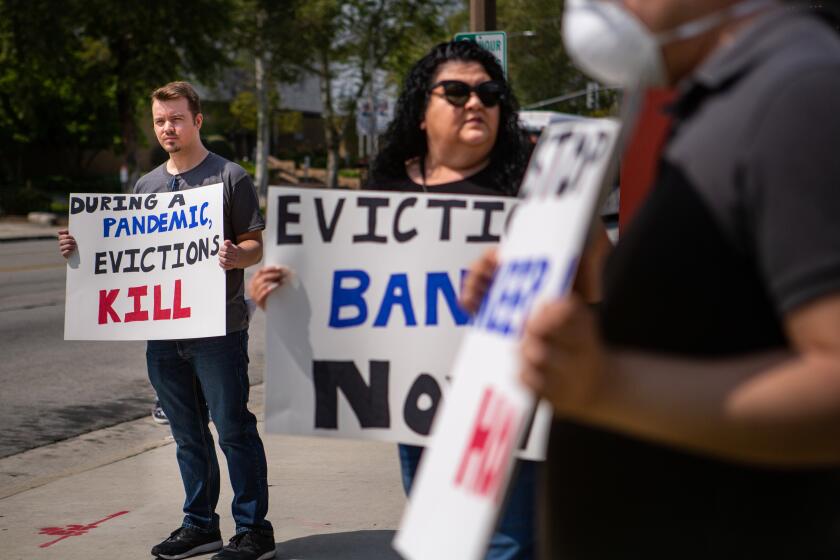Supreme Court rejects plea by landlords to lift federal eviction moratorium

- Share via
WASHINGTON — The Supreme Court is leaving a pandemic-inspired nationwide ban on evictions in place, over the votes of four objecting conservative justices.
The court on Tuesday rejected a plea by landlords to end the Centers for Disease Control and Prevention moratorium on evicting millions of tenants who aren’t paying rent during the COVID-19 pandemic. Last week, the Biden administration extended the moratorium by a month, until the end of July. It said then it did not expect another extension.
U.S. District Judge Dabney Friedrich in Washington had struck down the moratorium as exceeding the CDC’s authority, but put her ruling on hold. The high court voted 5 to 4 to keep the ban in place.
In a brief opinion, Justice Brett Kavanaugh said he agreed with Friedrich’s ruling, but voted to leave the ban on evictions in place because it’s due to end in a month and “because those few weeks will allow for additional and more orderly distribution of the congressionally appropriated rental assistance funds.”
Also last week, the Treasury Department issued new guidance encouraging states and local governments to streamline distribution of the nearly $47 billion in available emergency rental assistance funding.
Chief Justice John G. Roberts Jr. and the court’s three liberal members also voted to keep the moratorium in place.
The governor acted just hours after both houses of the Legislature approved the bill extending the eviction protections through Sept. 30.
Justices Samuel Alito, Amy Coney Barrett, Neil Gorsuch and Clarence Thomas said they would have ended it.
The eviction ban was initially put in place last year to provide protection for renters out of concern that having families lose their homes and move into shelters or share crowded conditions with relatives or friends during the pandemic would further spread the highly contagious coronavirus.
By the end of March, 6.4 million American households were behind on their rent, according to the Department of Housing and Urban Development. As of June 7, roughly 3.2 million people in the U.S. said they faced eviction in the next two months, according to the U.S. Census Bureau’s Household Pulse Survey.
More to Read
Get the L.A. Times Politics newsletter
Deeply reported insights into legislation, politics and policy from Sacramento, Washington and beyond. In your inbox twice per week.
You may occasionally receive promotional content from the Los Angeles Times.











